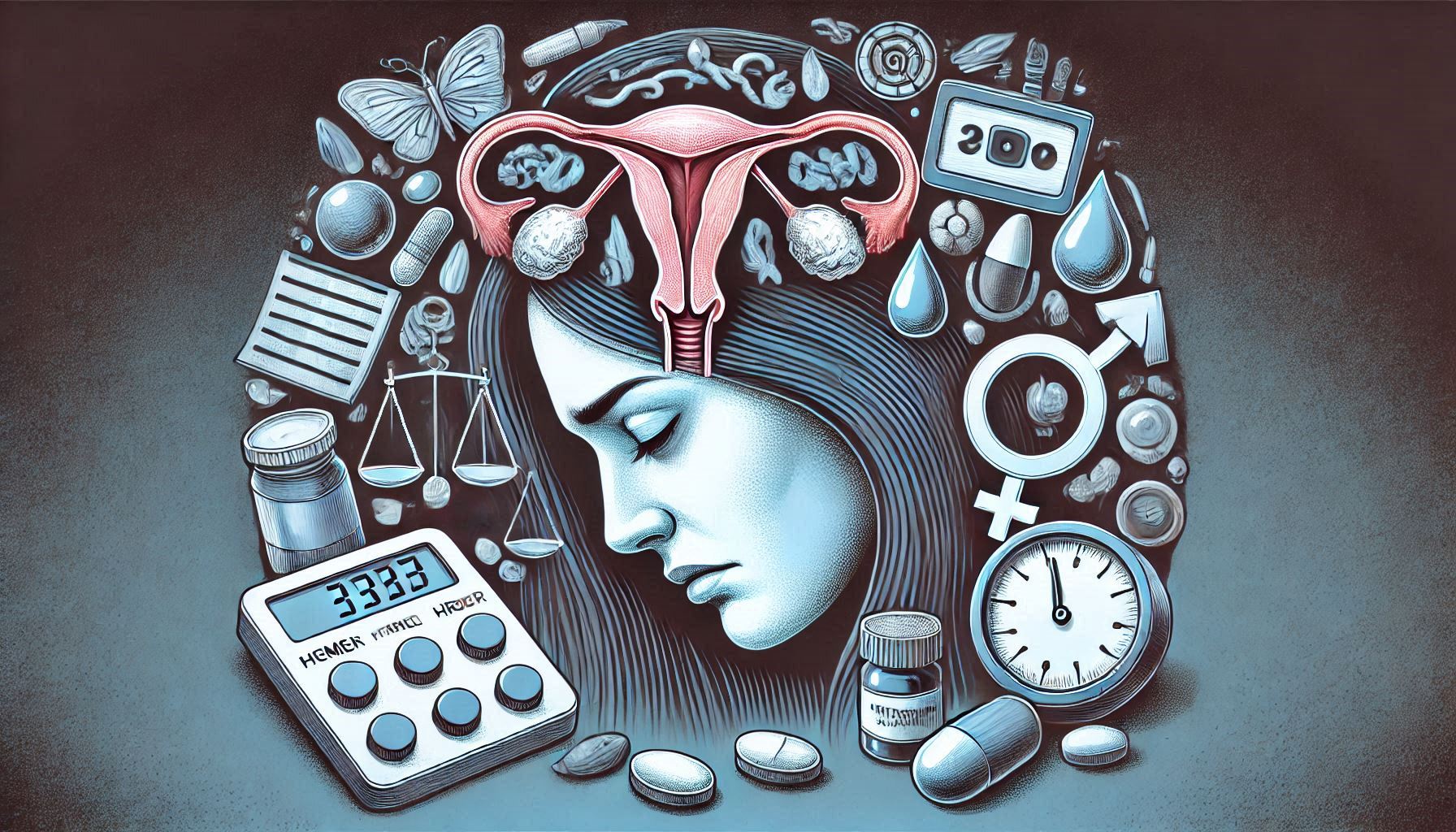Hormonal imbalances have long been recognized as a major contributor to various physical ailments, but their impact on mental health has only been recently explored in depth. Hormones are the body’s chemical messengers, influencing a wide array of functions, including mood, cognition, metabolism, and stress responses. The delicate equilibrium of hormone levels is essential for maintaining mental well-being. When hormones become unbalanced, they can lead to or exacerbate a variety of mental health disorders, including depression, anxiety, bipolar disorder, and more.
This guide will provide an extensive exploration of how hormonal imbalances affect mental health. It will delve into the different types of hormones that play pivotal roles in emotional regulation, cognition, and mental health disorders. Additionally, we will explore diagnostic approaches, treatment methods, and the future of personalized therapies in addressing hormonal imbalances.
Understanding Hormonal Imbalances
Hormones are substances produced by glands within the endocrine system, including the pituitary gland, adrenal glands, thyroid gland, ovaries, and testes. These hormones travel through the bloodstream to various organs and tissues, affecting everything from growth and development to mood and sexual function.
The body’s natural balance of hormones can be disrupted by a variety of factors, including genetics, environmental stressors, lifestyle choices, infections, autoimmune diseases, and underlying medical conditions. Hormonal imbalances can manifest in various ways, affecting both physical and mental health. Understanding how these hormonal fluctuations manifest in mental health is key to addressing underlying issues.
The Role of Cortisol in Mental Health
Cortisol, often referred to as the “stress hormone,” plays a central role in how the body responds to stress. Produced by the adrenal glands, cortisol is essential for regulating the body’s fight-or-flight response, modulating blood sugar, controlling inflammation, and influencing memory and mood.
High Cortisol and Mental Health Issues
Chronic stress can lead to an overproduction of cortisol, causing a range of mental health issues. In conditions like Cushing’s syndrome, where cortisol is produced excessively, individuals may experience symptoms such as depression, anxiety, fatigue, memory problems, and cognitive impairments. Elevated cortisol can also have physical effects, including weight gain, high blood pressure, and weakened immune function.
The mental health consequences of high cortisol levels are multifaceted. For example, sustained cortisol elevation has been shown to impair brain function, particularly in areas of the brain that regulate mood and memory, such as the hippocampus. Chronic high cortisol levels can contribute to persistent feelings of sadness, anxiety, and an inability to concentrate, which are often observed in mood disorders like depression and generalized anxiety disorder (GAD).
Low Cortisol and Mental Health Issues
On the opposite end of the spectrum, insufficient cortisol production, as seen in conditions like Addison’s disease, can also contribute to mental health problems. Low cortisol levels can cause symptoms such as irritability, fatigue, low motivation, and depressive feelings. Additionally, individuals with low cortisol may experience difficulty managing stress, leading to heightened emotional sensitivity and an increased risk of anxiety and depression.
Addison’s disease, characterized by adrenal insufficiency, results in not only physical symptoms like weight loss and low blood pressure but also significant mood disturbances. The combination of both physical and mental symptoms can lead to a reduced quality of life and ongoing challenges in managing mental health.
Estrogen and Progesterone in Women’s Mental Health
Estrogen and progesterone are two key hormones that play a significant role in the regulation of mood and emotional well-being. These hormones are particularly important in women, as they fluctuate during the menstrual cycle, pregnancy, and menopause. Changes in estrogen and progesterone levels are known to have a profound impact on mental health, leading to mood swings, anxiety, and depression.
Estrogen and Mental Health
Estrogen, primarily known for its role in regulating the reproductive system, also has important effects on the brain. This hormone helps regulate serotonin and other neurotransmitters involved in mood regulation. Estrogen fluctuations, such as those that occur during the menstrual cycle, pregnancy, or menopause, can lead to significant mood changes. Research has shown that low estrogen levels are associated with symptoms of depression, anxiety, and cognitive decline. The relationship between estrogen and serotonin is of particular interest, as serotonin is a neurotransmitter that plays a central role in mood regulation.
During periods of hormonal fluctuation, such as during perimenopause or menopause, the decrease in estrogen levels can lead to more severe mental health challenges. Many women experience what is known as “menopausal depression,” a form of depression that can be linked directly to hormonal changes. Furthermore, estrogen has been shown to influence the areas of the brain associated with memory and emotional regulation, which could explain the cognitive difficulties (often referred to as “brain fog”) and mood disturbances that some women experience during menopause.
Progesterone and Mental Health
Progesterone, which works in conjunction with estrogen, has its own significant impact on mental health. Often referred to as a “calming” hormone, progesterone plays a role in modulating the effects of estrogen and preparing the body for pregnancy. Low levels of progesterone are associated with symptoms such as anxiety, irritability, and insomnia. Progesterone also affects the GABA receptors in the brain, which help regulate relaxation and stress responses.
During the luteal phase of the menstrual cycle, when progesterone levels rise, women may experience mood swings or heightened emotional sensitivity. In more severe cases, a condition known as premenstrual dysphoric disorder (PMDD) can occur, where significant hormonal fluctuations result in severe mood disturbances, anxiety, and depression.
Hormonal Changes During Pregnancy and Postpartum
Pregnancy and the postpartum period represent another phase of life in which hormonal changes can significantly affect mental health. During pregnancy, elevated levels of estrogen and progesterone contribute to mood swings, irritability, and changes in cognition. In some cases, these hormonal fluctuations can trigger mental health challenges, including depression and anxiety.
Postpartum depression (PPD) is a condition that affects a significant number of women after childbirth. The sudden drop in estrogen and progesterone levels after delivery can trigger a range of emotional disturbances, from mild mood swings to more severe depressive episodes. Women experiencing PPD often feel overwhelmed, sad, and disconnected from their newborn, contributing to difficulties in bonding and caregiving. The complex relationship between hormonal changes, psychological stressors, and the new demands of motherhood makes PPD a multifaceted condition that requires comprehensive treatment.
Thyroid Hormones and Mental Health
The thyroid gland, located in the neck, produces hormones that regulate metabolism, energy, and overall vitality. These thyroid hormones, primarily T3 (triiodothyronine) and T4 (thyroxine), are crucial for maintaining physical and mental well-being. Imbalances in thyroid hormones, whether due to underproduction (hypothyroidism) or overproduction (hyperthyroidism), can have profound effects on mental health.
Hypothyroidism and Mental Health
Hypothyroidism, or an underactive thyroid, occurs when the thyroid gland produces insufficient amounts of thyroid hormones. This condition is commonly associated with symptoms such as fatigue, weight gain, and depression. Mental health symptoms associated with hypothyroidism include irritability, depression, difficulty concentrating, and memory problems, collectively known as “brain fog.”
In individuals with hypothyroidism, the lack of thyroid hormones can interfere with the functioning of neurotransmitters in the brain, including serotonin and dopamine, which are essential for mood regulation. As a result, individuals with hypothyroidism often experience feelings of sadness, low motivation, and emotional instability.
Hyperthyroidism and Mental Health
In contrast, hyperthyroidism, or an overactive thyroid, occurs when the thyroid produces excessive amounts of thyroid hormones. Hyperthyroidism can lead to anxiety, restlessness, insomnia, and mood swings. The increased levels of thyroid hormones can overstimulate the nervous system, leading to heightened stress responses and emotional volatility.
Hyperthyroidism can also cause physical symptoms, including weight loss, palpitations, and tremors. Mental health symptoms in individuals with hyperthyroidism are often exacerbated by the physical discomfort caused by the condition. The combination of anxiety, irritability, and insomnia can severely disrupt daily functioning and emotional stability.
Testosterone and Mental Health in Both Men and Women
Testosterone is primarily known as the male sex hormone, but it also plays an important role in the mental and physical health of women. Testosterone levels naturally decline with age, and imbalances in testosterone can contribute to a range of mental health issues.
Low Testosterone and Mental Health
In both men and women, low testosterone levels are associated with symptoms such as fatigue, depression, decreased libido, and difficulty concentrating. In men, low testosterone is a common cause of what is sometimes referred to as “andropause,” which is similar to the symptoms women experience during menopause. Men with low testosterone levels often report feeling depressed, unmotivated, and less engaged with life.
In women, low testosterone can lead to symptoms like mood swings, reduced sexual desire, and feelings of sadness or frustration. Hormonal therapies that address low testosterone can sometimes help alleviate these mental health symptoms.
High Testosterone and Mental Health
On the other hand, excessive testosterone levels, although less common, can also cause mental health issues. High testosterone can lead to irritability, aggression, and increased anxiety. In women, elevated testosterone levels may be associated with conditions such as polycystic ovary syndrome (PCOS), which often manifests with symptoms like mood swings, anxiety, and depression.
Mental Health Disorders Linked to Hormonal Imbalances
Numerous mental health disorders are linked to hormonal imbalances. These include:
Depression
Depression is often connected to imbalances in cortisol, thyroid hormones, and sex hormones. For example, low thyroid function (hypothyroidism) is associated with depression, and elevated cortisol levels are linked to stress-related depressive symptoms. Hormonal changes related to pregnancy, menopause, or the menstrual cycle can also trigger depressive episodes.
Anxiety Disorders
Anxiety disorders, including generalized anxiety disorder (GAD), panic disorder, and social anxiety, are frequently associated with hormonal imbalances, particularly elevated cortisol and thyroid dysfunction. High levels of cortisol, for example, can result in heightened stress responses, leading to symptoms of anxiety.
Bipolar Disorder
There is growing evidence that hormonal imbalances may contribute to the mood swings seen in bipolar disorder. Thyroid hormones, in particular, have been implicated in the fluctuations between mania and depression in individuals with bipolar disorder. The relationship between thyroid function and mood regulation remains an active area of research.
Postpartum Depression
Postpartum depression is a severe form of depression that occurs after childbirth, triggered by the abrupt drop in estrogen and progesterone levels following delivery. This hormonal shift, combined with the psychological stresses of new motherhood, can lead to feelings of despair, disconnection from the baby, and overwhelming sadness.
Premenstrual Dysphoric Disorder (PMDD)
PMDD is a severe form of premenstrual syndrome (PMS) characterized by debilitating mood swings, depression, and anxiety. The condition is linked to cyclical changes in hormone levels during the menstrual cycle and is believed to be triggered by hormonal sensitivity rather than an imbalance itself.
Diagnostic Approaches to Hormonal Imbalances
A comprehensive diagnostic approach is necessary to assess the relationship between hormonal imbalances and mental health disorders. This may include:
- Blood Tests: These tests measure the levels of various hormones, including cortisol, thyroid hormones, estrogen, progesterone, and testosterone. Abnormal levels of any of these hormones may indicate an imbalance that could be contributing to mental health issues.
- Imaging Studies: Imaging techniques, such as ultrasound or MRI scans, can help evaluate the structure and function of endocrine glands like the thyroid, adrenal glands, and pituitary gland. Abnormalities in these glands can lead to hormonal imbalances and affect mental health.
- Symptom Analysis: A detailed symptom analysis, often combined with a patient’s medical history, can help healthcare providers identify patterns of hormonal disruption and their potential connection to mental health challenges.
Treatment and Management of Hormonal Imbalances
Treating hormonal imbalances and their related mental health effects involves addressing both the physiological and psychological aspects of the issue. Several approaches are available to help restore hormonal balance and improve mental health outcomes.
Hormone Replacement Therapy (HRT)
Hormone replacement therapy (HRT) is commonly used to treat conditions related to menopause, hypothyroidism, or low testosterone. This therapy helps stabilize hormone levels and can alleviate mood swings, irritability, and depressive symptoms associated with hormonal fluctuations.
Medications
Medications such as antidepressants, anxiolytics, and anti-thyroid drugs are often used to manage mental health symptoms while hormonal imbalances are being corrected. Antidepressants and anxiolytics can address mood disorders like anxiety and depression, while anti-thyroid drugs are used to regulate excessive thyroid hormone production in cases of hyperthyroidism.
Lifestyle Modifications
A balanced diet rich in omega-3 fatty acids, vitamins, and minerals can support overall hormonal health. Regular exercise has been shown to regulate cortisol levels and improve mood by boosting endorphin production. Stress management techniques, such as yoga, mindfulness, and meditation, can also help reduce cortisol levels and promote emotional well-being.
Alternative Therapies
Acupuncture and herbal remedies have been used in some cultures to support hormonal balance and alleviate symptoms of mental health disorders. While these approaches may not replace traditional medical treatments, they can serve as complementary therapies.
Cognitive Behavioral Therapy (CBT)
Cognitive behavioral therapy (CBT) is an effective psychological intervention for addressing mental health issues associated with hormonal imbalances. CBT helps individuals recognize and change negative thought patterns that contribute to anxiety, depression, and other mood disorders.
Future Directions in Treatment
Advances in personalized medicine and endocrinology offer exciting possibilities for more targeted treatments for hormonal imbalances and mental health disorders. Emerging approaches include:
- Bioidentical Hormone Replacement Therapy (BHRT): This therapy uses hormones that are chemically identical to those produced by the body, offering a more tailored and natural treatment approach.
- Genetic Testing: By identifying genetic predispositions to hormonal imbalances and related mental health issues, healthcare providers can offer more individualized treatment plans.
- Psycho-Endocrinology: This interdisciplinary field explores the interdependence between hormonal and psychological therapies, aiming to create more integrated approaches to treatment.
Conclusion
Hormonal imbalances significantly influence the onset and progression of mental health disorders, often remaining underappreciated in clinical practice. Hormones such as cortisol, estrogen, thyroid hormones, and testosterone regulate mood, stress responses, and cognitive function. When these hormones become imbalanced, they can disrupt emotional stability, contributing to conditions like depression, anxiety, bipolar disorder, and postpartum depression.
Recognizing the intricate relationship between hormones and mental health allows healthcare providers to adopt a more integrated approach to treatment. Medical interventions, including hormone replacement therapy and medications to stabilize mental health, can address underlying imbalances. Complementing these treatments with lifestyle changes—such as a nutritious diet, regular exercise, stress management, and sufficient sleep—can further enhance hormonal equilibrium and alleviate mental health symptoms.
Psychological support, such as cognitive-behavioral therapy, also plays a crucial role in addressing the emotional impact of hormonal disorders, promoting resilience and mental well-being. By combining medical, lifestyle, and psychological strategies, individuals can achieve significant improvements in both physical and mental health.
As research into the connection between hormones and mental health advances, innovative therapies and personalized treatment approaches are expected to emerge. These developments hold promise for more effective solutions, offering hope and improved quality of life for individuals affected by hormonal imbalances and related mental health conditions.
SOURCES
Kiecolt-Glaser, J. K., & Glaser, R. (2010). Stress and immune function: Research in psychoneuroimmunology. Handbook of Clinical Neurology, 108, 125-140.
Epperson, C. N., Birmaher, B., Kuehner, C., Steiner, M., & Wittchen, H. U. (2015). Premenstrual dysphoric disorder: Evidence for a new category for DSM-5. American Journal of Psychiatry, 172(5), 468-477.
Korenman, S. G., & Meikle, A. W. (2002). The endocrinology of the adrenal glands. Endocrinology and Metabolism Clinics of North America, 31(2), 373-386.
Krukowski, A. L., Hardy, J. D., & Shaw, C. (2017). Hormonal influences on behavior and mood. Journal of Clinical Psychology, 73(9), 1339-1349.
Harlow, S. D., Gass, M., & Hall, M. (2014). The menopausal transition and mental health. Journal of Women’s Health, 23(11), 937-946.
Yen, S. S. C., Marshall, J. R., & Kaufman, J. (2003). Hormonal influences on psychiatric illness. The Journal of Clinical Psychiatry, 64(1), 55-58.
Chrousos, G. P. (2009). Stress and disorders of the stress system. Nature Reviews Endocrinology, 5(4), 63-69.
Pomeroy, C. L., Wright, R. D., & Glen, M. (2005). Thyroid function and its association with psychiatric symptoms. Journal of Clinical Psychiatry, 66(8), 1025-1030.
Berk, M., Bipolar, M., & Doherty, P. (2007). Hormones and mood disorders: The role of thyroid hormones in mood regulation. Australian & New Zealand Journal of Psychiatry, 41(5), 394-406.
Gupta, A. (2019). Psychological impact of PCOS: An overview of the mechanisms involved in pathophysiology and mental health. Journal of Endocrinology & Metabolism, 7(3), 229-238.
Wang, L., Patel, S. R., & Sengupta, S. (2014). Understanding the impact of the endocrine system on emotional well-being. Psychiatric Clinics of North America, 37(1), 107-120.
Sachs, G. S., & Lund, B. C. (2009). Thyroid dysfunction and depression. Journal of Clinical Psychiatry, 70(5), 690-697.
Pratt, D. (2002). The relationship between hormone therapy and depression. Psychiatric Clinics of North America, 25(2), 177-193.
Tennant, F. (2008). Hormonal imbalance and mental health disorders. Journal of Clinical Psychiatry, 66(10), 1400-1404.
Eisenberger, N. I., & Cole, S. W. (2012). Social neuroendocrinology: Implications for understanding the relationship between stress and disease. Social and Personality Psychology Compass, 6(4), 321-333.
HISTORY
Current Version
December 19, 2024
Written By:
SUMMIYAH MAHMOOD



